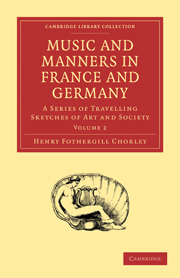Book contents
- Frontmatter
- Contents
- THREE DAYS IN THE HARZ COUNTRY
- GLIMPSES OF BERLIN
- CHAPTER I FIRST IMPRESSIONS.—“DER FRÈISCHUTZ”
- CHAP. II THE COURT AND THE OPERA
- CHAP. III SPECIMENS OF GERMAN NATIONALITY.—THE LÖWE
- CHAP. IV MORNING HOURS
- CHAP. V A LETTER TO A LADY
- CHAP. VI QUARTETTS AND AMATEURS
- CHAP. VII A GLUCK PILGRIMAGE.—THE “HULDIGUNG” IN 1840
- PARISIAN AUTHORITIES
CHAP. II - THE COURT AND THE OPERA
Published online by Cambridge University Press: 29 August 2010
- Frontmatter
- Contents
- THREE DAYS IN THE HARZ COUNTRY
- GLIMPSES OF BERLIN
- CHAPTER I FIRST IMPRESSIONS.—“DER FRÈISCHUTZ”
- CHAP. II THE COURT AND THE OPERA
- CHAP. III SPECIMENS OF GERMAN NATIONALITY.—THE LÖWE
- CHAP. IV MORNING HOURS
- CHAP. V A LETTER TO A LADY
- CHAP. VI QUARTETTS AND AMATEURS
- CHAP. VII A GLUCK PILGRIMAGE.—THE “HULDIGUNG” IN 1840
- PARISIAN AUTHORITIES
Summary
Though a more oddly assorted quartett of authorities could hardly be picked out than Voltaire, Dr. Burney, Zelter, and the musical editor of “The Atlas,” — each of them gives his drachma or his mite of information to those who seek the causes of the present state of Berlin Opera in its past history. From the philosopher-courtier, the friend of Johnson and Garrick, the worshipper of Goethe, and the pleasant man of modern art and letters, who mingles in his speculations the Hummels of Germany and the Hunts of Cockayne with a graceful and good-humoured individuality, we learn different parts of one and the same history.
But a little way up the Linden Strasse stands the magnificent Opera House, where all the splendours of the French lyric drama are exhibited under the nominal direction of M. le Chevalier Spontini. Though its interior decorations were faded when I saw it, it seems to me the handsomest and best proportioned theatre I have ever entered; large without vastness, and having that habitable look which is indispensable to the comfort of a place of public amusement, and, perhaps, unattainable in such a building as the Schauspiel Haus, where classical rigour of style is attempted. This is the identical theatre built by Knobersdorf, one of the chamberlains of Frederic II., with the grandeur of which, in the first days of Voltaire's sojourn at the Prussian court, he delighted to pique his far-away enemies at Paris.
- Type
- Chapter
- Information
- Music and Manners in France and GermanyA Series of Travelling Sketches of Art and Society, pp. 101 - 142Publisher: Cambridge University PressPrint publication year: 2009First published in: 1841



